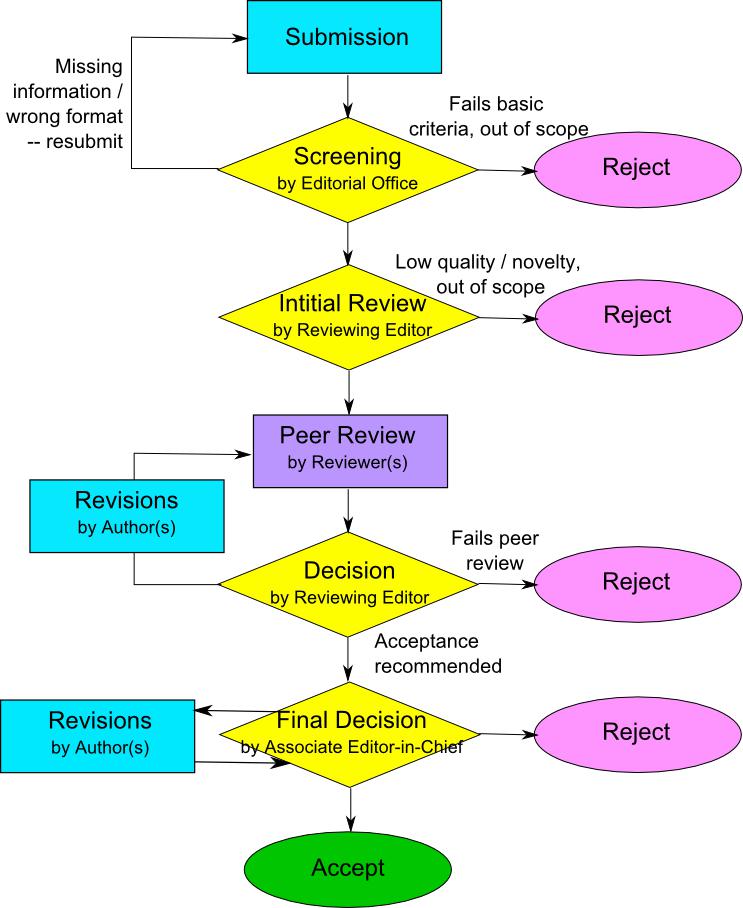Login and Review
To access the online review system, please log in here:
Reviewer Guideline
If you’re reading this, you’re probably a new reviewer for Chinese Physics C (CPC), or are considering being a reviewer, or want to remind yourself of the specific review guidelines for our journal.
There are many general documents available about peer review and being a reviewer. If this is your first time being a reviewer for any journal, we recommend IOP Publishing’s excellent “Introduction to Refereeing” guide, available at http://images.iop.org/referees/.
Before reviewing for CPC, please read the guidelines in this document carefully, as the processes for CPC may not be exactly the same as for other journals.
- Jounal Scope
Chinese Physics C (CPC) covers the fields of particle physics, nuclear physics, particle and nuclear astrophysics, and cosmology.
CPC publishes Regular Articles, Rapid Communications and Reviews. The manuscripts should be written in English.
- Review Process
Peer review is one stage of the process in deciding whether or not to publish an article in CPC. An overview of the whole process is shown in Figure 1.
Each paper is first screened by our Editorial Office, checking for formatting problems, missing information, plagiarism / copyright issues, and scope. If it passes that check, it is sent to one of our Reviewing Editors, all of whom are journal Board Members. They look at the quality and novelty of the research, and decide whether or not to send it for peer review. If it is sent for peer review, they decide how many reviewers are needed (usually 1 or 2), and who to invite asreviewers.
We use a “single blind” review process, which means that you can see the authors’ identities, but they do not know your identity.

Figure 1: CPC Editorial Process
The Reviewing Editors use the reviewers’ reports as input in deciding whether or not to recommend the manuscript for publication. If the manuscript is sent for revision, the revised manuscript is usually sent to the same reviewers for further review, but sometimes the Reviewing Editor will make a decision without further peer review, based on the reviewer reports and authors’ responses. When the Reviewing Editor is satisfied with the manuscript, he or she will recommend acceptance and send it to the Associate Editor-in-Chief for that subject area, who makes the final decision.
- Reviewer Role and Responsibilities
The reviewer plays a crucial role in the scientific process, ensuring that the papers we publish are high-quality, original work. That means that when you receive a review request, you are responsible for keeping to the high ethical standards generally expected of reviewers: honesty, confidentiality, integrity. If this is your first time reviewing and you want more details, read the IOP’s “Introduction to Refereeing” guide, available at http://images.iop.org/referees/.
We usually ask for a review to be completed within 2 weeks. If you receive a review request but feel unable to review that particular paper in the given time, please decline the review invitation. If you start reviewing but need more time, please contact us to arrange an extension.
If you are asked to review a paper but you feel you do not have enough expertise in that particular subject area, please let us know immediately. If you know someone else who could be a good reviewer for that paper, please give us their name so we can arrange for a different reviewer.
Ifyoudiscoveraconflictofinterest,suchasbeingaskedtoreviewapaperbyaformerstudentor collaborator, please let us know immediately and we will discuss the situation withyou.
If, when reviewing the paper, you discover evidence of plagiarism or fraud, please let us know immediately.
Do not contact the authors about the review, for any reason. If you need to ask them a question, please contact us.
- Review Report
For your report, you will be asked to fill in an online form on the CPC ScholarOne Manuscripts site https://mc03.manuscriptcentral.com/cpc.You can log in to your account on the system, using the details sent in your review invitation, or you can fill in the form without logging in, using the link sent in your reviewinvitation.
The review form has two parts: a tick-box score sheet, and an open text box. The score sheet asks you to rank the paper’s importance, novelty and originality, quality and correctness of the
research, and understandability and presentation. The text box gives space for you to write fuller comments, with a section for confidential comments to the Editor, and a section for comments to the author. You must enter some text in the “Comments to the Author” section to submit your review. You can also attach your report as a separate document – in this case, just write something like “See attached report” in the commentsbox.
Your report should focus on the following questions:
-Does the subject of the article fit the scope of thejournal?
-Is it of good scientific quality – rigorous and correct? Is it original work? Is it of interest to a wider scientificaudience?
-Is it clear and well structured? If not, what parts need improvement? Is the method explained clearly? Could someone replicate the work using the description in the paper? Are the results explained clearly? Does the discussion makesense?
-Have the authors included references to the most recent and relevantwork?
-Is the length suitable for the contents of the article? If it is too long, what should be cut out?
If too short, what should be expanded?
-Are the title and abstract suitable for thecontents?
-Are figures, tables and equations essential andclear?
-Istheconclusionaclearsummaryofwhathasbeenlearnedandwhyitisuseful?
For English language problems, you do not need to give detailed comments. Language corrections will be made by our in-house English editor if the paper is accepted. If the science is unclear because of poor language, however, you should point that out in yourreport.
Please number your comments, so that it’s easy for the authors to refer to them in their response.
Be specific in your comments – refer to the page / paragraph / line you are commenting on.
Please make sure that your comments do not show your identity. If you attach your comments as a separate documents, e.g. in Microsoft Word or as a PDF, make sure that your name is not embedded in thecomments.
Finally, remember to write your report in a professional, objective and courteous manner – the kind of report which you would find helpful as an author.
If you want to see whether a paper you reviewed was eventually accepted or not, you can always find out by logging in to your account on the CPC ScholarOne Manuscripts site and looking in the “Scores Submitted” section.
Thank you for being part of the CPC review team!
Reviewer Ethics
Reviewers should judge the quality of the manuscript objectively (including originality and novelty, importance to the field, quality and correctness of the research, understandability and presentation) and provide a constructive, comprehensive, evidenced and appropriately substantial peer review report.
Reviewers must refrain from personal criticism of the authors and give an unbiased consideration to all manuscripts regardless of the race, gender, religious belief, ethnic origin, citizenship, political philosophy, sexual orientation, age or reputation of the authors.
If there are any conflict of interest during the peer review process, reviewers should disclose the situation and inform the editorial office to change reviewer timely. Unless the reviewers are unable to review a paper, they should make all reasonable effort to submit review report and comment in a timely manner.
The peer review process must be kept in confidential. Reviewers must not share information or correspondence with anyone outside of the peer review process and not used for competitive advantage.
Reviewer should point out relevant work that has not been cited and inform editor any significant similarity between the manuscript and any published paper or submitted manuscripts of which they are aware.
Contact the Editorial Office
Chinese Physics C Editorial Office
Institute of High Energy Physics, Chinese Academy of Sciences
19B Yuquan Road
Shijingshan District
Beijing 100049
China
Email: cpc@ihep.ac.cn
Managing Editor: Hairong Dong, 董海荣
Email: donghr@ihep.ac.cn
For all queries regarding manuscripts, please contact the Editorial Office at cpc@ihep.ac.cn.
General enquiries (English / Chinese): +86 10 8823 6950
Typesetting, copy-editing and printing (Chinese): +86 10 8823 5947 (ask for Mr Yuefeng Wu, 吴岳峰)
Copy-editing, proof and journal mailing (Chinese): +86 10 8823 5947 (ask for Mr Jinpeng Liu, 刘金鹏)













